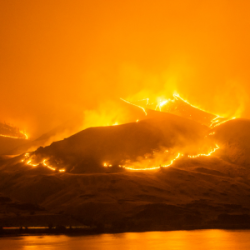
As we wrap up our series on the power of our voices to effect change, remember Mark’s gospel was written very close to the destruction of Jerusalem by Rome, either during the events leading up to that destruction or in its wake shortly after. Elijah prophetically represents all those who have stood up to and spoken truth to power. Elijah also had a mountaintop experience, yet his experience was a little different from Moses’. Elijah flees to the mountaintop in fear after standing up to Queen Jezebel. Here’s the story:
Welcome Readers! Please subscribe to Social Jesus Here.
(Read this series from the beginning at Part 1 and Part 2.)
Elijah was afraid and ran for his life. When he came to Beersheba in Judah, he left his servant there, while he himself went a day’s journey into the wilderness. He came to a broom bush, sat down under it and prayed that he might die. “I have had enough, LORD,” he said. “Take my life; I am no better than my ancestors.” Then he lay down under the bush and fell asleep. All at once an angel touched him and said, “Get up and eat.” He looked around, and there by his head was some bread baked over hot coals, and a jar of water. He ate and drank and then lay down again. The angel of the LORD came back a second time and touched him and said, “Get up and eat, for the journey is too much for you.” So he got up and ate and drank. Strengthened by that food, he traveled forty days and forty nights until he reached Horeb, the mountain of God.
There he went into a cave and spent the night. And the word of the LORD came to him: “What are you doing here, Elijah?” He replied, “I have been very zealous for the LORD God Almighty. The Israelites have rejected your covenant, torn down your altars, and put your prophets to death with the sword. I am the only one left, and now they are trying to kill me too.” The LORD said, “Go out and stand on the mountain in the presence of the LORD, for the LORD is about to pass by.” Then a great and powerful wind tore the mountains apart and shattered the rocks before the LORD, but the LORD was not in the wind. After the wind there was an earthquake, but the LORD was not in the earthquake. After the earthquake came a fire, but the LORD was not in the fire. And after the fire came a gentle whisper.
When Elijah heard it, he pulled his cloak over his face and went out and stood at the mouth of the cave.
In the story, Elijah “Go back . . . I reserve seven thousand in Israel—all whose knees have not bowed down to Baal and whose mouths have not kissed him.” (1 Kings 19:3-18)
Elijah is then told to descend from the mountain and to anoint Jehu as king and Elisha as Elijah’s successor as prophet.
In Mark’s version of the Jesus story, Jesus is also about to descend from the mountain he’s on. When he reaches Jerusalem, he will overturn the moneychangers’ tables, speak truth to power in solidarity with those being harmed, and face the imperial response due to all who oppose the so-called Pax Romana. The temple has become a conduit of Rome. It is not Judaism that Jesus is standing up against. He’s standing up against the complicity that the elites and powerful of his day are engaged in with the empire to the harm of the masses.
As Moses stood for liberation, Elijah stands for all those who have prophetically called for justice in the face of violent opposition by those in power who are threatened by their calls for change.
I can’t help but wonder if Mark’s original audience caught the parallels in this week’s story of God’s voice not being found in the wind, earthquake and fire, but in the still small voice. Could Jesus have been questioning what his own still small voice would ultimately accomplish in the face of systemic injustice in his own society? Could a point of these parallels be to encourage Mark’s audience and us today to just keep speaking?
Don’t think that change only comes from strong political winds, earth-shaking social quakes, or fire that burns the whole thing down: consider the violent events and failed attempts at liberation surrounding Jerusalem in the wake of its destruction. Change also comes from continued speaking out. What power does one voice have? This story reminds us that our voice, when we speak out against injustice, can have power for change. As Elijah was sent back down the mountain, and as Jesus was sent down from the mountain to face the powerful temple state in Jerusalem, we too today are called to speak out in our spheres of influence whenever people, the objects of God’s universal love, are being harmed.
Again, this story marks the transition point in Mark’s version of the Jesus story. In this moment, Jesus stands with Moses the great liberator and Elijah the prophet who stood up to corrupt rulers in positions of power and experience all that came in that wake. Jesus will soon leave and turn toward those in power in his own society, time, and place, just as both Moses and Elijah did.
That’s what’s happening in Mark’s gospel at this stage of the story. What is happening at this stage of your story? Are you conflicted with injustice and harm being done in our world today? Do you also need some encouragement that your voice matters? Are you afraid of the consequences of speaking out?
The way of love calls each of us, alongside of others, to speak out against injustice in your world, today.
#1 New Release on Amazon
Herb’s latest book, Finding Jesus: A Fundamentalist Preacher Discovers the Soci0-Political and Economic Teachings of the Gospels is #1 New Release available now on Amazon.















